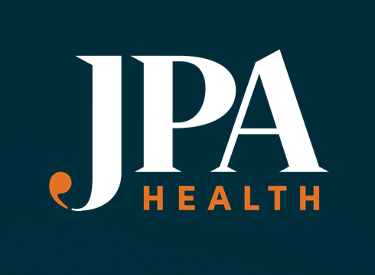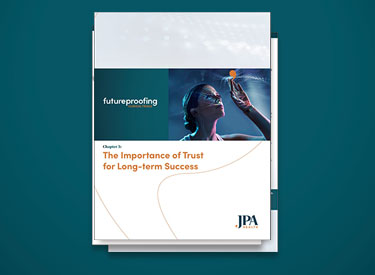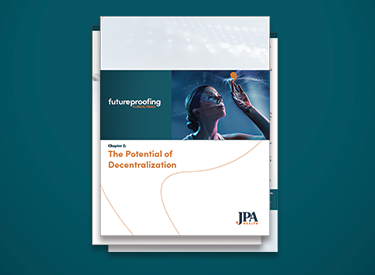Where Science Meets Strategy
At JPA Health, we excel in propelling life science companies forward, from emerging biotech companies to established pharmaceutical giants.
We build connections throughout the product life cycle, ensuring a deep understanding of the dynamic needs of your diverse stakeholders. Our goal? To deliver a seamless, agile strategy that resonates every step of the way.
From pre-clinical research to product launch and beyond, we thrive in highly technical domains, turning complex information into clear, impactful messages. For companies navigating the challenging path from clinical to commercial, we offer a comprehensive understanding of patient profiles and market dynamics.
Our team of strategists combines data and creativity with expertise across core disciplines – Marketing, Patient Advocacy, Public Relations, and Medical Communications. Each area is exceptional on its own but even more powerful when working together. We understand the nuances required to navigate the medical, regulatory, and legal landscapes, ensuring your message is both compelling and compliant.
We’ve supported major product launches and provided strategic counsel to some of the world’s leading companies in these sectors.
• Pharmaceutical
• Biotechnology
• Medical Device
• Diagnostics
• Medtech
• Digital Health & Health Tech
JPA Health is where innovation, strategy, and communication converge to drive growth and make a lasting difference.
Our Clients

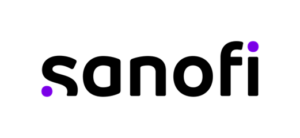







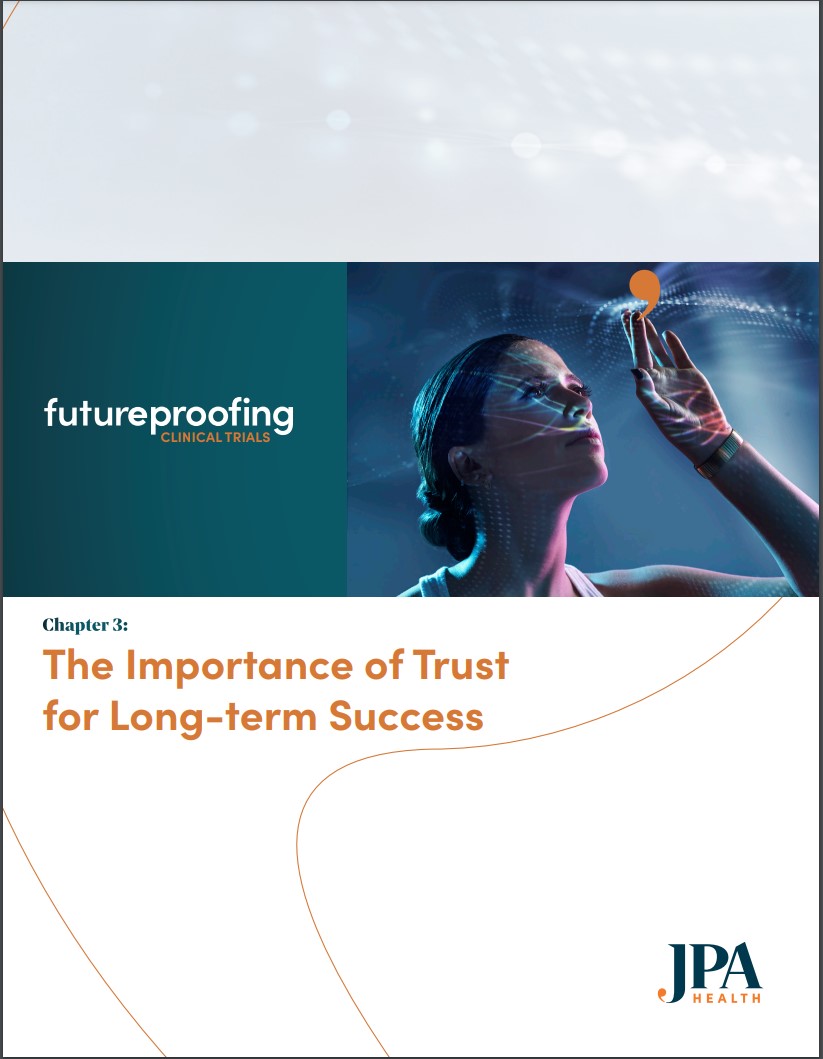
Chapter 3: The Importance of Trust for Long-Term Success
In the third chapter of our whitepaper series, Futureproofing Your Clinical Trials, we explore enhanced communication strategies designed to improve clinical trial recruitment, enrollment and retention.
This chapter is focused on the role of consistent communication across stakeholders for the purpose of optimizing the clinical trial experience, streamlining the clinical trial process and ultimately, earning the trust that will contribute to clinical trial success.

Our Expertise
Advocacy & Public Affairs
Marketing & Advertising
Medical Communications
Public Relations
Health Tech & Services
Public Health
Life Sciences
Federal Government
Featured Insights
Our Strategic Partners
JPA Health partners with companies in the life science, pharmaceutical, healthcare, and clinical research sectors to better serve clients’ needs and goals.




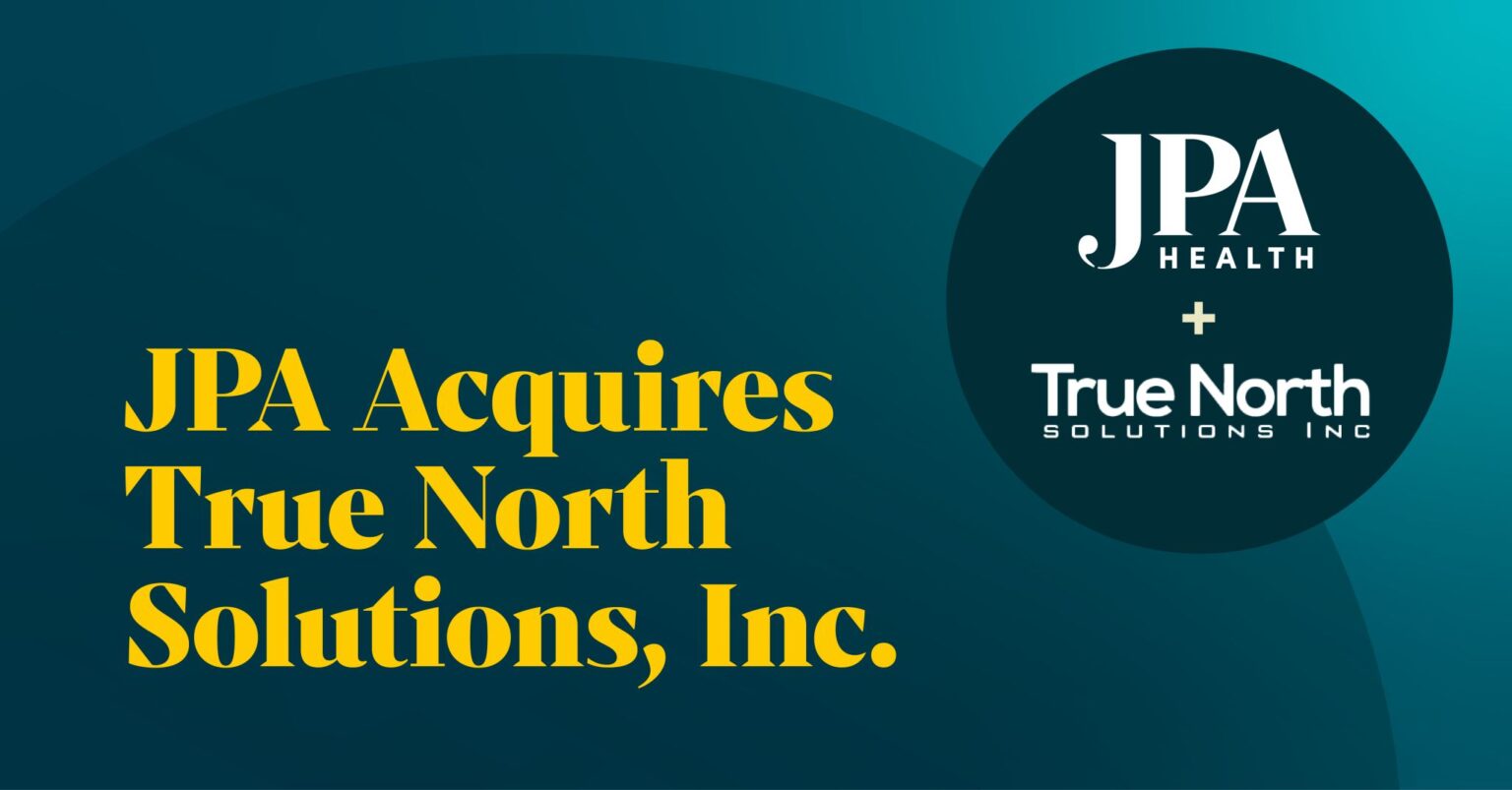
Addition brings together synchronized experts to offer comprehensive predictive analytics, data visualization and AI-driven end-to-end solutions for life sciences, government and non-profit organizations.
Washington, D.C., October 18, 2023 – JPA Health, a global full-service, integrated agency, today announced the acquisition of True North Solutions, Inc., a consulting firm based in Cambridge, Mass. True North specializes in commercial, clinical, and medical affairs, with expertise in digital acceleration and customized predictive analytics, as well as solutions powered by AI and natural language processing. This acquisition, the first for JPA Health, will further expand JPA’s strategic offerings providing end-to-end integrated medical affairs, clinical development, commercial strategy, creative marketing, public relations and patient advocacy solutions to clients.
Key Takeaway
– JPA acquires True North Solutions
– Expansion in data analytics expertise
– Strengthens JPA’s service offerings

Related Case Studies
“Here at JPA Health, we utilize cutting-edge data and analytics technology to uncover valuable insights that fuel our success,” said Carrie Jones, CEO of JPA Health. “The addition of True North Solutions, with its profound expertise in creating custom solutions rooted in data sciences, will help keep our clients ahead of their competition in connecting with target audiences and driving results. We extend a warm welcome to the entire True North team, individuals who share our passion for helping people live healthier lives.”
True North Solutions, led by founder Colin Baughman, was founded in 2016. The company has led projects spanning dozens of therapeutic areas, including CNS, oncology, infectious diseases and rare diseases for many of the largest pharmaceutical companies globally. True North focuses on eight key areas: brand strategy, healthcare professional and patient experience, launch excellence, medical strategy, performance management, KPIs and evaluation, predictive analytics and visualization, and segmentation and persona modelling. As a Google Cloud partner, True North offers commercial grade AI, predictive and visualization capabilities.
“We are thrilled to become part of the JPA Health team, bringing together our deep expertise in AI-driven data analytics solutions with the scale and expertise of a full-service healthcare agency,” said Baughman. “By taking a creative approach to data analysis, visualization and discovery we dramatically accelerate insight generation for our clients. Whether through claims-based patient geospatial research, adaptive territory design or AI-driven medical insights, we continually test the limits of possibility for our clients. Joining JPA Health presents new opportunities to elevate this work while delivering end-to-end research, marketing and commercialization solutions to our customers.”
Baughman brings more than 20 years of experience in the life science industry with expertise across commercial, medical, market access and clinical development functions. He will join JPA Health as an executive vice president (EVP) based in Boston, Mass. All True North employees, including Baughman, will join JPA Health.
About JPA Health
JPA Health is an award-winning independent, full-service agency established in 2007. With four offices in the U.S. and UK (Washington, D.C., New York, Boston, London), the company provides omnichannel marketing, public relations, and advocacy services. JPA Health recently was awarded PR Daily’s Agency of the Year, 2023 and included in MM+M’s Agency 100. The firm is a leader in the health sector recognized for its work designing health campaigns that drive change and deliver measurable results. The JPA Health team is passionate about helping people live healthier lives. To learn more, visit www.jpa.com
The AI-driven strategic and messaging tool comes with uncompromised data confidentiality
GRETEL Trails is the only AI-Insights engine to be backed with over a decade of audience analysis
WASHINGTON, DC, July 10, 2023 — JPA Health, a full-service, independent marketing and communications agency, today announced the launch of its new marketing tool, GRETEL Trails. Designed to enhance clients’ communications strategies, this AI-powered insights engine and chatbot unites the power of GPT-4 alongside JPA Health’s proprietary precision communications platform, GRETEL®.
Leveraging a decade plus of data, along with machine learning algorithms, these platforms merge together comprehensive research to create customized trails for each client’s unique project. These innovative tools provide clients with insights necessary to curate impactful, targeted communication campaigns along with unprecedented understanding of complex and difficult to engage audiences.
Key Takeaway
– Reinventing omnichannel marketing
– GRETEL Trails boosts content strategy

Related Case Studies
“We are witnessing a transformative shift in the way we work, driven by rapid advancements in data analytics and artificial intelligence,” said Carrie Jones, CEO of JPA Health. “At JPA Health, we have fully embraced this technology and acted swiftly to provide our clients with a cutting-edge tool that empowers them to make data-driven decisions. It’s no longer just about delivering messages; it’s about delivering the right messages to the right people at the right time. With GRETEL Trails, we are redefining the way our clients connect, communicate, and thrive in this ever-evolving landscape.”
Ken Deutsch, who leads the Research and Insights team at JPA Health, added: “We strive to enable our clients to engage with and understand their target audiences more effectively and deliver their messages with utmost precision and impact. We are delighted to roll out GRETEL Trails, a powerful new resource that will revolutionize how life science companies understand and engage with their target audiences.”
GRETEL Trails leverages an extensive dataset of social media posts discussing relevant health issues and cross-references it with millions of audience and segmentation data records. By utilizing GPT-4 trained with audience-specific data for each health topic, JPA Health ensures accurate and impactful responses while maintaining the confidentiality of client data. No data input by GRETEL is used to train GPT-4, guaranteeing uncompromised data security.
In addition, JPA Health offers organizations an enhanced tool, GRETEL Trails+. This digital solution incorporates current market research data and insights, such as in-depth interviews (IDIs), surveys, and personas for a holistic view of target audiences. Designed for marketers, the interface incorporates a user-friendly chatbot making it an easy application to analyze vast amounts of data in seconds.
GRETEL Trails will be available to clients immediately. For more information about GRETEL Trails, please visit www.jpa.com.
About JPA Health
JPA Health is an award-winning independent, full-service agency established in 2007. With offices in the U.S. and UK, the agency provides marketing, public relations, and advocacy services. JPA Health recently was awarded PR Daily’s Agency of the Year, 2023. The firm is a leader in the health sector for its award-winning work designing health campaigns that drive change and deliver measurable results. The JPA Health team is passionate about helping people live healthier lives. To learn more, visit www.jpa.com.
About GRETEL®
The proprietary GRETEL precision communications engine is designed to help users navigate the complex landscape of health communications by providing data-driven insights, identifying trends and understanding audience preferences. By analyzing large datasets, it can identify themes, trends and preferences within specific health topics, enabling the development of targeted and effective messaging strategies to engage with audiences.
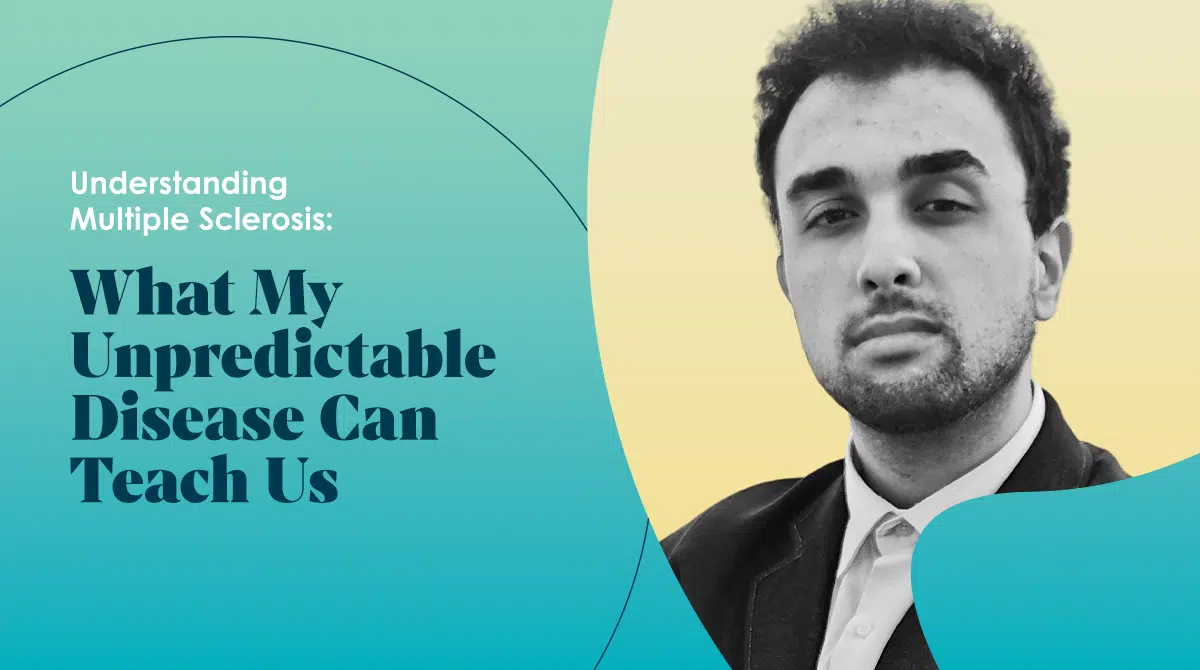
Multiple Sclerosis (MS) is a chronic, unpredictable disease of the central nervous system and it affects each person differently. Symptoms range from numbness, tingling, weakness, fatigue, and vision problems. In more serious cases, MS can impact a person’s mobility, cognitive abilities, and emotional well-being. The unpredictable nature of the disease can also cause stress and anxiety for both the person living with MS and their loved ones.
World MS Day is a global event that takes place on May 30th each year. It’s a time to raise awareness about MS, celebrate the resilience of those living with the disease, and inspire action towards better understanding, care, and treatment. The theme for this year’s World MS Day is “Connections,” emphasising the importance of social support and networks for people with MS.
Key Takeaway
– Chronic conditions need support
– MS continues to be misunderstood
– Advocacy and research matters

Related Case Studies
My Diagnosis and Living with MS
My personal experience with MS highlights the importance of World MS Day and the need for greater awareness of the disease. It all started when I was misdiagnosed with optic neuritis at the age of 19. At the time, I was studying hard for my exams and didn’t think much of it when I woke up one morning and couldn’t see out of my right eye. However, this was just the beginning of my journey with multiple sclerosis. It wasn’t until I had a relapse at the age of 23 while in Paris that I was properly diagnosed with MS. It was a scary and uncertain time, and I wasn’t sure what my future would hold. But as I learned more about MS, I realised that I wasn’t alone. There is a whole community of people living with MS who understand the challenges and struggles that come with this disease.
Living with MS can be a challenging and unpredictable journey, but it can also be an opportunity for personal growth and self-discovery. The disease has taught me to live in the present, appreciate the little things in life, and prioritise my health and well-being. You learn to be more patient, resilient, and adaptable, and to find joy and meaning in everyday moments. This is also the case for many of the estimated 2.8 million people living with MS worldwide.
Understanding MS Makes a Difference
People living with MS need support and understanding from their family, friends, and healthcare professionals. A positive and supportive work environment can also make a significant difference; JPA Health is one such example of a company that understands the importance of supporting employees with chronic health conditions. Many employers are recognising the benefits of creating inclusive and supportive work environments that enable people with chronic illnesses, like MS, to thrive. Knowing that I have JPA Health’s support has made a huge difference in my life and has empowered me to keep pushing forward, even on the toughest days.
One of the biggest challenges facing the MS community is the lack of public understanding and awareness about the disease. Many people are unaware of what MS is, how it affects people, and the impact it can have on the lives of those living with the disease. This lack of awareness can lead to stigma, discrimination, and can make it difficult for people with MS to access the care and support they need.
Another challenge facing the community is access to care and treatment. While there is no cure, there are treatments available for the disease, but they can be expensive and not always accessible to everyone who needs them, leading to disparities in care and treatment.
Why Advocacy and Research Matter
Advocacy efforts are needed to ensure that people with MS have access to the care and support they need. This includes advocating for affordable and accessible treatments, as well as for policies that support the needs and rights of people with MS. World MS Day provides a platform for advocacy efforts, with events and activities around the world aimed at raising awareness and promoting change.
Research is also needed to better understand the causes of MS and to develop more effective treatments. While progress has been made in recent years, there is still much that is unknown about the disease. World MS Day provides the perfect opportunity to raise funds for research into the causes of MS, as well as for the development of new treatments and therapies.
How to Support
As World MS Day approaches, I am reminded of the importance of raising awareness about this disease and advocating for those living with MS. My story is just one example of the challenges and struggles that individuals with MS face every day. By sharing our stories, we can help to break down the stigma surrounding MS and promote greater understanding and support. I hope that on May 30th and beyond, we can all come together to show our support for the MS community and work towards a world where everyone affected by MS has access to the care and support they need.
To learn more about MS and how you can get involved or donate, you can visit the following organizations: National Multiple Sclerosis Society and Myelin Repair Foundation, and in the UK Multiple Sclerosis Trust and MS Society.
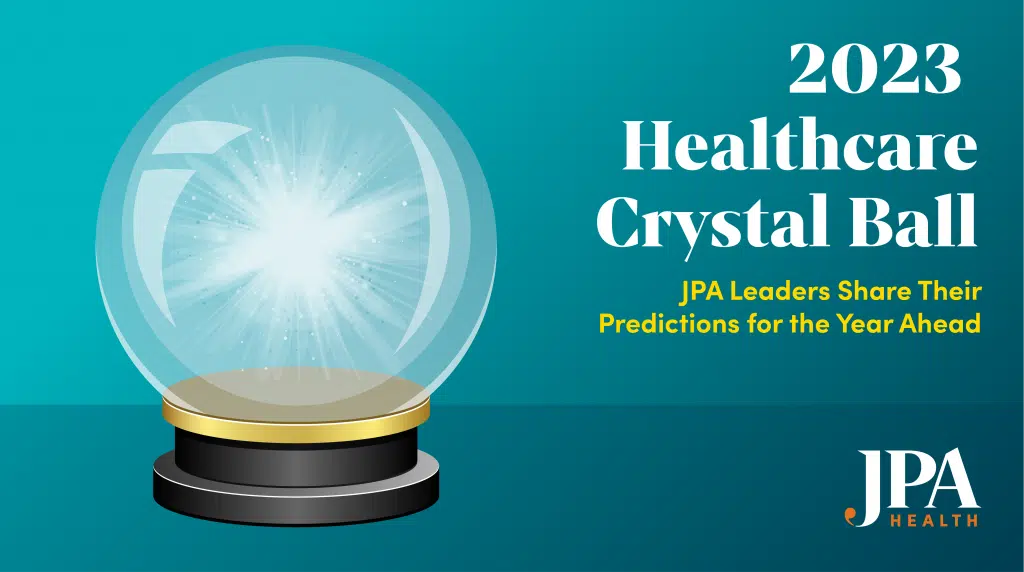
We asked our practice leads from across the agency to share – in 23 words or less – what is something new in the healthcare PR and marketing landscape that they expect to see in 2023? Here is what they said:
- Samantha Cranko, Life Science Corporate Communications Lead: Impressive innovation in biotech and pharma goes hand in hand with pricing concerns – expect more focus on communicating treatment value for cost.
- Karen Goldstein, Public Health Practice Lead: I’m feeling optimistic there will be continued collective focus and action on social drivers of health to improve public health, particularly health equity.
- Kelly McNeil, Life Science Marketing Group Lead: Education and tools for APPs (advanced practice providers) will be paramount, as the need continues to go beyond the doctor in resource-strapped times.
Key Takeaway
– Tech shifts disrupt digital media
– Focus on mental health, biotech
– Emphasis on health equity, education

Related Case Studies
- Grace Wahlbrink, Digital Marketing Lead: Shakeups in tech are starting to destabilize the digital media landscape. Strategic flexibility will drive success for health companies on social in 2023.
- Christina Zurla, Federal Government Practice Lead: I foresee federal health agencies continuing to support (and fund) efforts that address and help normalize mental health and wellbeing.
By Diane Wass, Managing Director
This week Deaf Awareness Week focuses on the theme of ‘inclusion’, highlighting the impact of hearing loss on everyday life and increasing visibility and inclusion of Deaf people, especially underrepresented groups such as immigrants, BMI and women. It also emphasises how people living with Deafness in education, health settings and the workplace are often overlooked and the impact this can have on mental health.
As a person with severe category hearing loss, who wears bilateral hearing aids, I am proud to be the Managing Director of the International Hub of a communications agency, as it challenges all the misconceptions and stigma the public can have about people living with hearing loss and their capabilities. It was probably because of my hearing loss that I always loved to write and think deeply- while growing up writing was my escape. However, living with hearing loss is not without challenges and creating a society where we ‘enable’ people to leverage their talents and live without fear & stigma is key.
What is it like living with Hearing Loss?
As I stood in a crowded Euston station last Tuesday evening, I heard that familiar beep beep beep of dying batteries that those of us who are dependant on bilateral hearing aids will all relate to. My world was suddenly enveloped with an indistinguishable muffle of very low-level noise, with speech no longer distinguishable. There can be something deeply calming about suddenly being absorbed in cotton wool, stepping away from that synthetic, sometimes squeaky noise hearing aids generate and all the commotion of a busy station. However, then the panic arises as I can no longer sense where I am amongst the crowd, I can’t hear that person about to bump into me from behind, people annoyed at me as I didn’t hear their ‘excuse me’ and you can literally be ‘knocked off balance’.
Then there is the fear of navigating the train station pharmacy to see if I can purchase batteries, knowing if the shop assistant asks me something, I won’t be able to hear them-no matter how hard I try- and I’ll end up eventually having to ‘fake it’, pretending I’ve heard as it is so awkward to ask them to repeat it again and I have no idea what I’ve just smiled and agreed to (and by the way this often happens when my hearing aids are working too, especially since everybody started wearing masks). It also reminds me of the time I was run down in a supermarket carpark because I didn’t hear someone start up their engine, or the sleepless nights with the baby monitor by my ear terrified I might not hear my newborn wake, even though she was sleeping in the same room. This is my ‘everyday’ and it is no surprise to me how without the right support and empathy that Deafness and hearing loss can be very isolating and leave people scared to leave the safety of their home.
What Can We Do?
The UK Council for Deafness have a whole host of tips and advice on how to support people living with Deafness and Hearing Impairment that you can read here. Here are my 5 top tips that I wish someone had told me, I had been confident enough to speak up about or wish my colleagues had known early on in my career:
- Technology. I cannot emphasise enough the importance of assistive technology as an enabler. Don’t struggle on without exploring all the options out there. Don’t delay in getting hearing aids if these would be useful for you, they will be transformative-it is not until you get them you realise how much of your brain power was wasted just trying to decipher what people are saying. Amplified desk-phones and speaker phones in conference rooms can be very helpful too. You can also couple your hearing aids to a small microphone that you can place in proximity to a speaker at a conference table. I personally have downloaded a speech to text app. on my phone as back-up too. Assistive technology is evolving all the time, from vibrating fire alarms to auto-text software. Workplaces need to assess the individual need and support investing in technology to enable their staff with hearing impairment. If based in the UK, Access to Work can support companies in this assessment, provide grants and make suggestions on what technology and adjustments may be helpful.
- Don’t Phone Me. You know what drives me mad, when companies have these huge cultural drives where they think it is cool to encourage people to ‘pick up the phone’. This might work for the majority of people, but not for those of us who are hard of hearing. Either stop by my desk so I can lip-read while you are talking to me or even Zoom me as I can still see your lips. And for very little extra cost did you know that you can purchase auto-text for Zoom calls that can be switched on or off by choice (thanks to Mike Dixon from the Healthcare Communications Association for that tip!). And if it is really important that I know all the detail, drop me an e-mail or if you want something more informal you can find me on WhatsApp. Or MSTeams.
- Offer Up Your Seat. I am at a stage of life now where I feel comfortable being open about my hearing impairment and asking people to move so that I can take a position in the room where I can actually both hear better and see the lips of people. However, that wasn’t always the case. If we are at the side or back of a room then there really is no point in us being in the room at all. In round table meetings we need to be in a central seating position where we can see the lips of everyone around the whole table. If listening to a speaker, if we can’t see their lips we are unlikely to get the definition we need to hear, so we need to be near the front. Offer up your seat to your hearing-impaired colleague as it hard for them to ask you to move. And one more thing we cannot hear you if you all talk at once, take turns, it’s actually the polite thing to do anyway.
- Repeat the Question Another tip is if you are giving a presentation and there are questions from the audience, repeat the question before you answer. Equally, if you are facilitating a panel or chairing a presentation session where you have someone with hearing-impairment participating, repeat the question from the audience for them.
- Catch my Attention & Don’t Cover your Lips. Alert Alert Alert if you are behind me or I haven’t noticed you the chances are I can’t hear you. Tap me on the shoulder lightly, catch my attention or even better just come around the front of where I am so I can fully see you want to talk to me. And don’t cover your lips-I need to see them to distinguish those beginnings and ends of words. I had one colleague where every time I asked her to repeat what she had said she found yet another way of covering her lips- behind a briefcase, piece of paper, standing in a shadow or looking the other way, it was so frustrating as I always ended up just giving up asking her to repeat herself.
Finally, my one piece of advice I would give to anyone else out there is to remember it is not just about Deafness and Hearing Impairment ‘awareness’ but also about ‘inclusion & acceptance’. The person is not ‘disabled’ but the environment can be ‘disabling’ (ask yourself how well a hearing person would cope in a room full of people chatting away in sign language). If you are hearing impaired do not be afraid to ask for what you need in order to contribute fully in your job, follow your dreams and believe in yourself. For people supporting someone in the workplace, every person’s need is different, so ask the person with hearing impairment themselves what might help, understand the challenges they may be having in the workplace and co-create solutions to resolve these.
By Akeia Blue and Joel Lopez
Health equity has become a growing priority over the past 18 months in light of the COVID-19 pandemic. As more people seek to consider health equity in all aspects of their work, it will be increasingly important to understand the principles and components of what it really means to deliver equitable care. One aspect of health equity that is particularly critical for health communication efforts is cultural humility. Defined as an ongoing commitment to learning about other cultures, cultural humility is key to developing appropriate communication campaigns that incorporate the values of the target audiences.
Two of JPA’s team members, Akeia Blue and Joel Lopez, talk about the role of cultural humility in their lives and in their work as health communicators.
What is cultural humility to you, and why is it important?
Akeia – Cultural humility is how we work to learn about cultures and people outside of ourselves to come to an empathetic understanding of their experiences and, in the context of health communications, how those experiences have affected their health and their ability to receive and act on health information. It is important to incorporate cultural humility in our work as health communicators to ensure that the campaigns that we are developing are in the best interest of, and are useful to, the audiences we are trying to reach.
Joel – Cultural humility goes further than competency or acceptance. It is the act of humbling myself and putting aside any potential assumptions or biases I may have about how much I know about an individual, culture, or community. Cultural humility also means acknowledging that individuals, families, and communities are experts of their own lived experiences. They can share information about their traditions, culture, and history to help me better understand the nuances and their unique perspectives.
As a communicator, cultural humility is important because it reminds me that I don’t know everything about the audiences I am trying to reach. Public health impacts individuals that span the full spectrum of demographics – including people from various geographical locations and different religions, as well as a wide range of racial and ethnic backgrounds. Cultural humility requires me to seek out my preconceived notions, humble myself by listening to and learning from the people I am trying to communicate with, and create a mutually respectful relationship. Then I apply the lessons learned to my communications practice.
How can public health stakeholders build strong relationships with communities experiencing inequities?
Akeia – When I think about cultural humility, I immediately think back to one of my professors who was fortunate enough to have deeply studied the Amish community. They allowed him to come in and live within their community so that he could learn about them, which is not common. He taught us that in order to build those types of relationships with communities outside of your own, you have to be authentic and humble. Public health stakeholders have to approach communities with open minds and listen to the leaders and members of the community, while allowing them to contribute to the project every step of the way.
Joel – I’m often reminded of the popular health slogan “Nothing About Us, Without Us” when working in public health communications. Public health stakeholders must take the time to listen to and involve members of the public – especially those experiencing inequities – in their approach to solving health problems and promoting positive, healthy behaviors in society. When working with communities outside of my own, I approach relationship building with curiosity by asking questions that aim to help me understand my audience. I evaluate the impact of my work on the communities I’m trying to reach and adjust my approach based on the evidence. I also prioritize establishing and building trust with the community. Historically a lack of trust between patients and healthcare providers has led to negative public health impacts. Approaching health communications with a lens of cultural humility can help to work towards rebuilding the trust that was lost.
As a person of color, why do you feel it is important that cultural humility is applied to public health and communications?
Akeia – At a very young age, I remember learning about the Tuskegee Syphilis Study and how that affected the way I viewed the public health and healthcare systems. Additionally, I often heard my Nana express her distrust of the healthcare system and experienced firsthand the frustration of having healthcare providers offer inadequate communication to myself and my loved ones. As a health communicator now, I often look back and think about how different our experiences with the healthcare system could have been had we been asked questions for understanding. Taking the time to understand a person’s reasoning or fears can allow healthcare professionals to provide empathetic care without undermining the person’s concerns.
Joel – Growing up in a Mexican household, I saw firsthand the implications of systemic distrust, poor health literacy and a lack of understanding of why health and healthy behaviors are important. My extended family – which consisted of dozens of aunts, uncles, cousins, and grandparents – would often consult one another on complex, important health conditions – and often this family advice received would supersede that of health professionals. Now working as a health communications professional, I understand the importance of having the balance of a support system in addition to having access to information based on the evidence, and healthcare professionals who can help you understand what it means for you and your specific needs.
Looking ahead, what can health communicators do to develop campaigns that can contribute to discussion on health topics respectfully and inclusively?
Akeia – Our role in developing campaigns should begin with understanding the concerns of the audience we are trying to reach. It is our job to be clear about how that population defines the problem or need so that we can address that rather than creating our own to address. We listen to people from the community who are trusted and then work with them to disseminate the messages in ways that are easily received. Truly practicing cultural humility requires you to take the ego out of your work and openly admit that you may not be the expert so that you can rely on those who are.
Joel – As communicators, we can think about how our messages and campaigns contribute towards equitable health outcomes for all people. We can consult and collaborate with the communities we are trying to reach and ensure the inclusion of representatives or advocates from those communities in the process of crafting communications strategies and messages. We can approach our work with humility and the flexibility to take a different approach based on the needs and characteristics of the communities we serve. Most of all, we can embrace diversity by tailoring our messages for the different communities we are trying to reach, rather than taking a “one size fits all” approach to health communication.
What’s one aspect of working at JPA that you appreciate most when it comes to cultural competency?
Akeia – I love that at JPA we take the time to research and incorporate various types of research to help us deliver culturally appropriate campaigns. We are all willing to take a step back and recognize that we don’t always have the answers and reach out to the experts who can help us get them. We are a passionate group of people who strive hard to deliver beautiful, diverse and well thought out campaigns to improve the health of people.
Joel – At JPA, I appreciate the variety of cultures, ethnicities, races, and religions that are represented throughout our organization’s staff. We embrace the diverse, intersectional nature of individuals and encourage members of the team to always consider the “why” behind our work. Our clients represent a broad spectrum of health areas that impact individuals and families across the globe. As communicators, we get to play a role in helping our clients convey accurate, compelling and meaningful information that ultimately aims to improve the lives of those we reach.
Check out our Public Health Practice to learn more about our work in health equity.
By Christina Zurla, SVP, Federal Government Practice
On the heels of the US Surgeon General’s advisory about the worsening state of youth mental health and CDC’s latest release of the 2020 provisional numbers and rates of suicide, Dr. John Draper, Executive Director of the National Suicide Prevention Lifeline, spoke with JPA’s Christina Zurla about emerging issues in suicide prevention and how health communications can make an impact.
How has the pandemic impacted the conversation around suicide prevention?
John: Talking about suicide prevention is more important now than ever. When COVID first hit, there was a sense that we were going through a shared pandemic experience. But as things open back up, everyone will adjust differently. Some people will embrace it, while others may feel socially anxious or struggle due to grief, a job loss, or loss of contact with family or friends. During COVID, many people lost a sense of connection and community, which can lead to feelings that are associated with suicidality. Especially at this moment in the pandemic as we are rejoining activities and engagements at different speeds, we need to think about protecting people who feel despair or a lack of belonging.
Christina: Suicide rates have been rising for the past twenty years and in every state in the U.S. The pandemic was a reminder of the critical importance of focusing attention on suicide prevention. The pandemic also reinforced just how integral mental health is to overall health. As public health communicators, it is our responsibility to make sure we are considering mental health as part of overall health campaigns, because it is a key factor for a person’s readiness to take up a health message or change behavior.
During the pandemic, connection shifted almost entirely to virtual communications, with many turning to social media. How did that impact mental health?
John: Virtual connections are not the same as face-to-face encounters, and social media is not a substitute for connection. Particularly for young people, social connection with peers is critical to developing a sense of belonging and identity (“Who am I?” and “Who am I in relation to others?”). On social media, people say things they wouldn’t say in person and empathy can either be compromised or lost in translation. It’s also a comparison trap, insofar as what people post online are often their best moments and images, not the fuller experience of their lives; comparing one’s own life to a series of “perfect images” of others has been shown to reinforce symptoms of depression and anxiety, particularly in teenage girls. The pandemic disrupted connection and we need to focus now on fostering community and a sense of belonging and support, offline.
Christina: Social media use is at an all-time high, with more than 70% of the public using at least one social media platform. Part of our job is to “meet people where they are” when delivering health messages; and social media will no doubt continue to be at the forefront of our dissemination strategies. That means harnessing the reach of social platforms but going a step further to find deeper connections with our audiences, such as by partnering with influencers they trust, sharing personal stories, and working with community-based organizations to offer on-the-ground and in-person support and follow-up about a specific health issue or topic.
What are some proven approaches for communicators to use when addressing suicide prevention and other mental health topics?
John: The best thing we can do is share stories about people who have overcome despair and suicidal thoughts. Not stories about suicide methods, but stories that can connect with someone while also showing a path through crisis. Research has shown that when people are exposed to stories of people who have found help, hope and/or healing through moments of suicidal despair, suicide rates decline in these exposed populations. We should also tell stories about navigating the challenges of finding help and share messages that are caring and promote acceptance. Those types of messages make a positive difference and can help reduce the stigma.
Christina: It’s also for communications efforts to acknowledge what people are experiencing, provide resources, and include loved ones as part of the process. For the Physicians Foundation, JPA developed Vital Signs to raise awareness about and prevent suicide among physicians. On National Physician Suicide Awareness Day this year, we expanded Vital Signs by creating NPSADay.org, serving as an online reminder and call to action for physicians, their loved ones, and their colleagues to learn the signs, start conversations, and share resources that can help those in distress seek mental health care. Within one month of the launch of NPSADay.org alone, we reached 83.2 million people and encouraged 26,000 positive actions to be taken online and in communities.
Are there things that every person can do to prevent suicide?
John: Suicide is preventable. People everywhere can take action to prevent suicide. The National Suicide Prevention Lifeline (800-273-8255) provides free confidential support for people in distress as well as prevention and crisis resources for loved ones. And in July of 2022, a national three-digit number (988) will be enabled so anyone anywhere in the U.S. and territories can quickly access help for themselves or a loved one, when in mental health or suicidal crisis. Also, our #BeThe1To campaign focuses on five steps for supporting a friend, colleague or loved one who may be suicidal. One of the most important steps is to be present; to listen and to let the person know that you care about them and that they’re not alone.
Christina: Also, check out other organizations that offer suicide prevention resources tailored to specific audiences, such as, the Suicide Prevention Resource Center the American Foundation of Suicide Prevention, Suicide Awareness Voices of Education (SAVE), The Trevor Project, and the Veterans Crisis Line.
With Thanksgiving upon us, JPA principal Carrie Jones extends thanks and gratitude to our inspiring clients and to our incredible team for a year filled with growth. This year, JPA received the “triple crown of accolades,” including:
- PR Week’s Outstanding Small Agency of the Year
- MM+M Midsize Healthcare Agency of the Year
- Modern Healthcare Agency of the Year
It has been a big year for JPA and we could not have achieved all this without our team and our clients. Here’s to an exciting year ahead and the opportunity to continue doing meaningful work across public health and life sciences!
WASHINGTON, D.C., October 25, 2021 – JPA Health, a full-service, independent marketing and communications agency, announced today the addition of Kelly McNeil to its Boston office as a senior vice president (SVP). McNeil brings over 20 years of health marketing experience leading award-winning interdisciplinary teams across the life sciences, pharmaceutical, wellness and medical device sectors, among others.
In her role at JPA Health, McNeil will be leading the firm’s brand marketing efforts for the Life Science practice and supporting the firm’s growth across the biotechnology, pharmaceutical, medical devices, and health tech and diagnostics sectors.
“Boston continues to be an essential market for health innovation and our award-winning unbranded disease education and brand creative campaigns are driving rapid growth for the firm,” said Carrie Jones, principal of JPA Health. “Kelly will deliver enormous value to our clients and team with her marketing acumen, including broad experience launching new and expanding existing brands across the life sciences sector. We are thrilled to welcome her to the team.”
Prior to joining JPA, McNeil worked at precisioneffect, MERGE|Boston and Copernicus, leading large-scale AOR relationships and launch and expansion marketing initiatives for such organizations as Alnylam, Takeda, Biogen, Pfizer, UCB and Boston Scientific. In addition to her agency roles, she is a founding partner of Kindling: A Strategic Marketing Think Tank, an incubator of strategy, marketing and business development services for entrepreneurial ventures, and also a founding partner of In the Bag/Cry for Dawn Productions, an entertainment event production and public relations company.
“In the current healthcare climate, having a robust, insightful and carefully crafted marketing strategy is more important than ever before to build genuine credibility and authentic connections with medical professionals and patients,” said McNeil. “I am very excited to join this remarkable team at JPA and further expand the agency’s brand creative, digital marketing and advertising capability.”
About JPA Health
JPA Health is an award-winning independent, full-service agency established in 2007. With offices in the U.S. and UK, the agency provides marketing, public relations and advocacy services. JPA Health recently was awarded MM&M Midsize Healthcare Agency of the Year, 2021. The firm is a leader in the health sector for its award-winning work designing health campaigns that drive change and deliver measurable results. The JPA Health team is passionate about helping people live healthier lives. Learn more at jpa.com.

